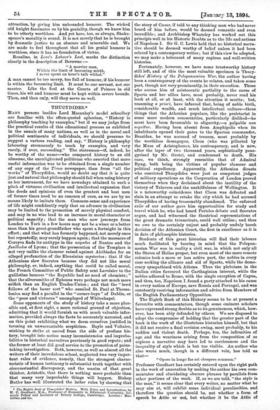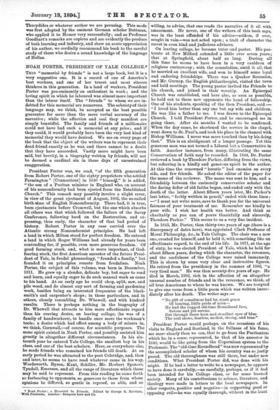TH1JCYDIDES.*
MANY persons besides Lord Macaulay's model schoolboy are familiar with the often-quoted aphorism, "History is philosophy teaching by examples," but if we may judge from the practical results of this educational process as exhibited in the annals of many nations, as well as in the moral and political sentiments of individuals, we should presume to suggest a various reading, and say, "History is philosophy labouring strenuously to teach by examples, and very rarely, if ever, succeeding!' The statesman—if, indeed, he be worthy of the name—who compared history to an old almanac, the unenlightened politician who asserted that more useful information was to be obtained from a single number of any copy of the Times newspaper, than from "all the 'works" of Thucydides, would no doubt say that it is quite just and natural that philosophy should fail when using history as her instrument, for we have nowadays attained to such a pitch of virtuous civilisation and intellectual expansion that the deeds and opinions of even the greatest and best men .of former times need be no concern of ours, as we are by no means likely to imitate them. Common-sense and experience of life might confidently reply that an advance in civilisation may be limited to the promotion of merely physical comfort, and may in no wise lead to an increase in moral character or political sagacity; that the man who now journeys from London to York in a few hours may not be a wiser or a better man than his great-grandfather who spent a fortnight in this effort; and that what has formerly happened, not merely once but repeatedly, may surely happen again; that the massacre of Corcyra finds its antitype in the noyades of Nantes and the fusillades of Lyons; that the persecution of the Templars is not very unlike the clamour raised against .Alcibiades for an alleged profanation of the Eleusinian mysteries ; that if the Athenians slew Socrates because they did not like moral philosophy, or, indeed, anything that could be called moral, the French Committee of Public Safety sent Lavoisier to the guillotine because "the Republic had no need of chemists ; " that the silversmiths of Ephesus were perhaps not much more selfish than an English Trades-Union ; and that the "lewd fellows of the baser sort" who assailed St. Paul at Thessa- lonica may find a parallel in the " corner-boys " of Dublin, or the "poor and virtuous" unemployed of Whitechapel.
Some opponents of the study of history take a more plau- sible and, at first sight, a more rational ground of objection, admitting that it would furnish us with much valuable infor- mation, provided always the facts be accurately narrated, and on this point exhibiting what we deem ourselves justified in terming an unwarrantable scepticism. Bayle and Voltaire, wishing to strike at sacred from the side of profane his- tory, brought into notice many inconsistencies and improba- bilities in historical narratives previously in good repute; and the former at least did good service to the promotion of pains- taking investigation. Both, however, as well as almost all the writers of their incredulous school, neglected two very impor- tant rules of evidence, namely, that the strongest charac- teristic of human testimony is substantial truth together with circumstantial discrepancy, and the maxim of that great thinker, Aristotle, that there is nothing more probable than that many very improbable things will• happen. Bishop Butler has well illustrated the latter rules by showing that
• The Eighth Book of Thotoodides' History. With Notes and Introduction, by H. C. Goodhart. M.A., Professor of Humanity in Edinburgh Univeisity, for- merly Fellow and ,Lecturer of Trinity College, Cambridge. London: Mac- millan and Co.
the story of Cresar, if told to any thinking man who had never heard of him before, would be deemed romantic and even incredible ; and Archbishop Whateley has worked out this principle well in his Historic Doubts as to the life and actions of Napoleon I. Sir G. C. Lewis held that no historical narra- tive should be deemed worthy of belief unless it had been related by a contemporary writer; but if this view be adopted, we may make a holocaust of many copious and well-written histories.
Fortunately, however, we have some trustworthy history
still left, and of this the most valuable specimen is Thucy- dides' History of the Peloponnesian War, the author having been a contemporary of the events he relates, and taken some part, though not very prominently, in their execution. Those who accuse him of aristocratic partiality to the cause of Sparta and her allies have, most probably, never read his book at all, or at least, with the attention it merits ; but, reasoning a priori, have inferred that, being of noble birth, considerable wealth, and much intellectual culture—three things that the Athenian populace, like the proletariat in some more modern communities, particularly disliked—he must have been favourable to oligarchy,—a palpable non sequitur. Having been absent from Amphipolis when its inhabitants opened their gates to the Spartan commander, Brasidas, he was accused of treason, most probably by the worthless demagogue, Cleon (who was pilloried by the Muse of Aristophanes, his contemporary, and is now, after the lapse of two thousand years, sophistically pane- gyrised by Mr. Grote), and condemned to death. His case, we think, strongly resembles that of Admiral Byng, both being the victims of popular clamour and political expediency. Apparently, the Athenian dicasts who convicted Thucydides were just as competent judges of military operations as the Corporation of London proved themselves when they declaimed about the inutility of the victory of Talavera and the unskilfulness of Wellington. It is a noteworthy coincidence that Cleon was defeated and slain in an attempt to retake the city which he had accused Thucydides of having treasonably abandoned. The enforced exile of our author gave him opportunities for study and travel which he, who had heard Pericles debate and Socrates argue, and had witnessed the theatrical representations of the great dramatic triumvirate, could well utilise; and thus we owe to the certainly unjust and probably unduly harsh decision of the Athenian Court, the first in excellence as it is in date of philosophic histories.
Students of this great historian will find their labours much facilitated by bearing in mind that the Pelopon- nesian War was in reality a civil war, in which not only all the States of Hellas proper, but even most of the more remote colonies took a more or less active part, the nobles in every case seeking the alliance and aid of Sparta, while the demo. cracy sympathised with Athens. Thus the plebeians in the Italian cities favoured the Carthaginian interest, while the nobles adhered to Rome, with the single exception of Capua, and thus, too, Napoleon I. found a party attached to his cause in every nation of Europe, save Russia and Portugal, and was constantly receiving information and advice from Members of the English Parliamentary Opposition.
The Eighth Book of this History. seems to be at present a favourite with commentators, though some eminent scholars have expressed strong doubts as to its genuineness, which, how- ever, has been ably defended by others. We are disposed to adopt the compromise of holding that. the greater part of the
book is the work of the illustrious historian himself, but that it did not receive a final revision owing, most probably, to his sudden and violent death. Perhaps, too, the infirmities of age and the weariness arising from the composition of so copious a narrative may have led to carelessness and the inequality of style which is but too visible. An author who also wrote much, though in a different vein, has told us that-
" Opere in longo fas eat obrepere somnum."
Professor Goodhart has certainly entered upon the right path in the work of annotation by making the author his own com- mentator and elucidating obscure phrases by parallels from other portions of the work. If, as we are told, "the style is the man," it seems clear that every writer, no matter what he may aim at, will exhibit some individual peculiarities, and therefore the question should be, not whether a form of speech be Attic or n4 but whether it be the Attie of
Thucydides or whatever author we are perusing. This mode was first adopted by the eminent German scholar Buttraan, who applied it to Homer very successfully; and as Professor Goodhart's remarks are copious and are evidently the produce of both learning and industry, and show an acute appreciation of his author, we cordially recommend his book to the careful study of those who desire a sound knowledge of the language of Hellas.







































 Previous page
Previous page